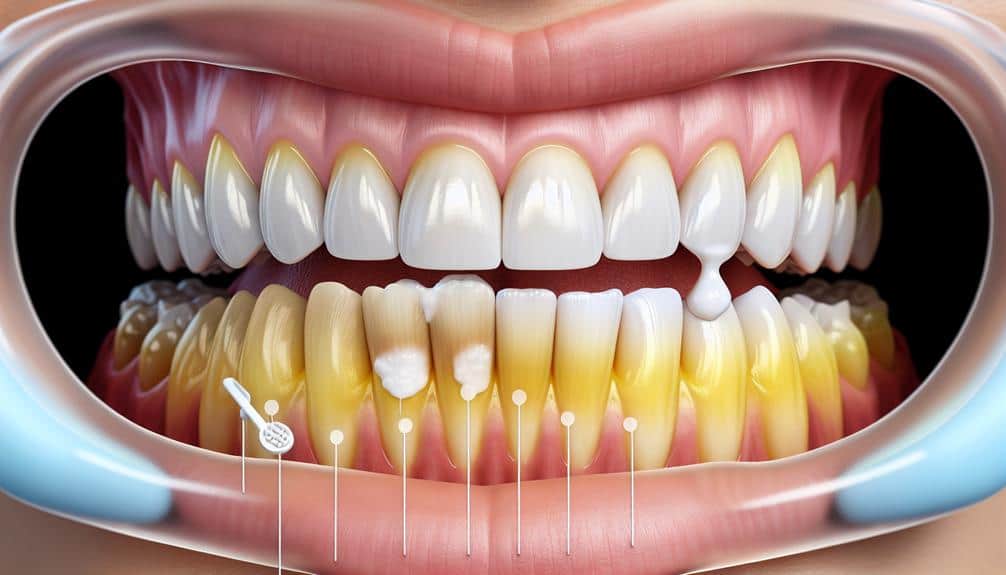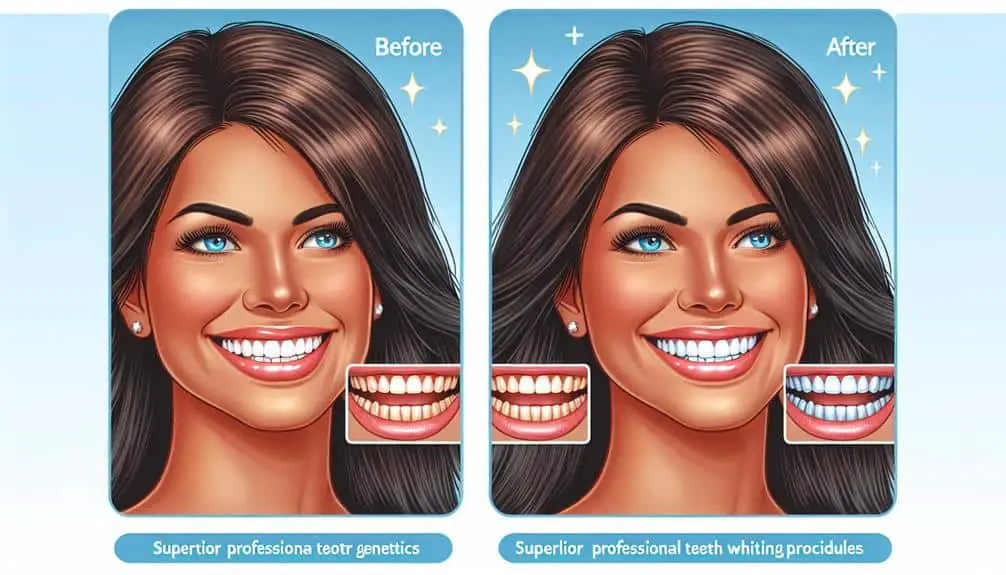To whiten genetic discoloration, consider professional laser therapy for deep stains. Bleaching trays offer uniform results. At home, try whitening kits with gel or natural methods like baking soda. Herbal remedies or oil pulling may help too. Consult your dentist for guidance. Keep results by using whitening toothpaste and avoiding staining foods and drinks. Regular dental check-ups are key. For more detailed insights into whitening genetic discoloration, explore the various treatment options available for a brighter smile.
Key Points
- Professional whitening treatments like laser therapy target deep-seated genetic stains effectively.
- Consult a dentist for at-home whitening options to complement professional treatments.
- Natural remedies such as activated charcoal offer alternative solutions for genetic discoloration.
- Maintain results with whitening toothpaste and avoid foods that stain teeth.
- Consistent oral hygiene and regular check-ups are crucial to monitor and prevent genetic discoloration.
Understanding Genetic Tooth Discoloration
Genetic tooth discoloration occurs when inherited traits influence the natural color of your teeth, resulting in varying shades that can be difficult to manage. The causes of genetic tooth discoloration are deeply rooted in genetic variations affecting enamel thickness, dentin structure, and overall tooth development. These genetic factors can lead to teeth appearing more yellow, brown, gray, or even blue compared to the typical white color associated with a healthy smile.
Diagnosing genetic tooth discoloration involves a thorough evaluation by a dental professional. They'll assess your family history, examine the appearance of your teeth, and may conduct tests to determine the exact cause of the discoloration. Through this process, dentists can differentiate between genetic discoloration and other types of tooth staining, such as those caused by lifestyle factors or medication.
Understanding the causes and receiving an accurate diagnosis of genetic tooth discoloration is essential for developing an effective whitening treatment plan tailored to your specific needs.
Professional Whitening Treatments
When considering professional whitening treatments for genetic tooth discoloration, consult with a qualified dental professional to explore effective options tailored to your specific needs. Professional whitening treatments offer advanced solutions that can greatly improve the appearance of genetically discolored teeth. In-office procedures conducted by skilled professionals often utilize laser therapy to target deep-seated stains, providing more immediate and noticeable results compared to at-home options. Additionally, custom treatments, such as bleaching trays tailored to fit your teeth precisely, allow for a controlled and uniform whitening process.
Laser therapy in professional whitening treatments can enhance the effectiveness of the procedure by activating whitening agents for deeper penetration, resulting in a more thorough whitening effect. Bleaching trays customized by dental experts make sure that the whitening solution is evenly distributed across the teeth, minimizing the risk of uneven whitening or sensitivity issues. These professional methods combine expertise with advanced technology to deliver superior results in addressing genetic tooth discoloration.
At-Home Whitening Options
Considering exploring at-home whitening options as a complementary approach to professional treatments can provide a convenient and accessible method to maintain and enhance the results achieved in-office.
DIY whitening kits are a popular choice for individuals seeking to whiten their teeth at home. These kits often contain whitening gel and trays that mold to your teeth for a customized fit. They can be a cost-effective solution compared to repeated professional treatments.
Baking soda remedies, on the other hand, have gained attention for their natural whitening properties. Baking soda is mildly abrasive, which can help remove surface stains when used in toothpaste or mixed with hydrogen peroxide to form a paste.
That being said, while at-home whitening options can be effective, they may not provide the same level of whitening as professional treatments. Consulting with a dentist before starting any at-home whitening regimen is recommended to ensure safety and effectiveness.
Natural Remedies for Discoloration
What're some effective natural remedies for discoloration of teeth that can be considered as alternatives to professional whitening treatments? Herbal remedies and DIY treatments can offer a more natural approach to help whiten teeth with genetic discoloration.
Herbal remedies like using activated charcoal or baking soda can help remove stains on the teeth. Activated charcoal has been praised for its ability to absorb toxins and stains, making it a popular choice for teeth whitening. Baking soda, on the other hand, can act as a mild abrasive to scrub away surface stains.
DIY treatments such as oil pulling with coconut oil or using a mixture of hydrogen peroxide and water can also aid in reducing discoloration. Oil pulling is an ancient technique that involves swishing oil around in your mouth to remove bacteria and stains. Hydrogen peroxide, when diluted with water, can act as a gentle bleaching agent to lighten the color of teeth.
While these natural remedies may show some improvement, consulting with a dental professional is crucial to confirm that these methods are safe and effective for your specific case of genetic discoloration.
Maintaining Results and Prevention
To maintain the results of whitening treatments and prevent future discoloration, consistent oral hygiene practices and regular dental check-ups are essential. Vital solutions for maintaining whitened teeth include lifestyle changes and dietary adjustments.
Brushing your teeth at least twice a day with fluoride toothpaste and flossing daily can help prevent stains from forming on your teeth. Additionally, using a whitening toothpaste can help maintain the brightness of your teeth between treatments.
Regular dental check-ups are vital for monitoring the health of your teeth and catching any signs of discoloration early on. Your dentist can provide professional cleanings to remove surface stains and offer advice on how to best care for your teeth at home.
Preventive measures such as avoiding foods and drinks that stain teeth, like coffee and red wine, can also help prolong the results of whitening treatments. By incorporating these practices into your daily routine, you can enjoy a brighter smile for longer periods.
Frequently Asked Questions
Can Genetic Tooth Discoloration Be Completely Reversed With Whitening Treatments?
Genetic tooth discoloration may not be completely reversible with whitening treatments due to the nature of the underlying causes. While whitening treatments can be effective in improving the appearance, complete reversal may not always be achievable.
Are There Any Specific Dietary Recommendations to Prevent Genetic Tooth Discoloration From Worsening?
To prevent genetic tooth discoloration from worsening, focus on dietary impact. Avoid foods and drinks that stain teeth, like coffee and red wine. Maintain good oral hygiene, visit your dentist regularly, and consider whitening treatments for maintenance.
How Long Do the Results of Professional Whitening Treatments for Genetic Discoloration Typically Last?
For genetic discoloration, professional whitening treatments typically last long term with proper maintenance. Compared to at-home options, professional treatments often provide more effective and lasting results. Consistent care and follow-up visits can help maintain your bright smile.
Are There Any Specific Oral Care Products or Ingredients That Are Particularly Effective for Maintaining Whitening Results in Genetic Discoloration Cases?
To maintain whitening results in genetic discoloration cases, you should consider using whitening toothpaste and mouthwash. These products can help upkeep the effects of natural remedies and professional treatments, ensuring a brighter smile for longer.
Are There Any Potential Risks or Side Effects Associated With Long-Term Use of At-Home Whitening Options for Genetic Discoloration?
When contemplating long-term use of at-home whitening options for genetic discoloration, it is crucial to be aware of potential risks and side effects. Overuse can result in heightened tooth sensitivity and gum irritation, affecting your oral health.



